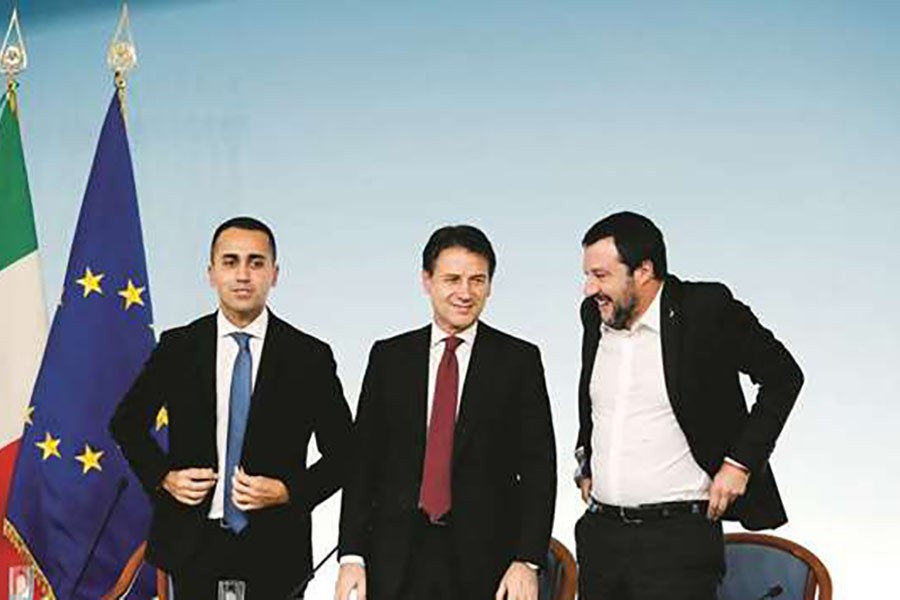As the home of both the Roman Empire and the Renaissance, Italy has long been at the forefront of cultural developments in Europe and Western Eurasia. But it has also long served as an example of political decline. Edward Gibbon's classic The History of the Decline and Fall of the Roman Empire, after all, was meant as a warning to the author's empire-building contemporaries.
Italy's economic stagnation after the early seventeenth century was also held up as a cautionary tale. The nineteenth-century English critic John Ruskin implored members of Britain's mercantile society to ponder the tragedies of Tyre and Venice. Describing Venice in "the final period of her decline," he wrote of "a ghost upon the sands of the sea, so weak — so quiet — so bereft of all but her loveliness, that we might well doubt, as we watched her faint reflection in the mirage of the lagoon, which was the City, and which the Shadow."
Then came the post-World War II period, when Italy was the poster child for fruitful European integration. The country developed a cultural style that is still uniquely influential to this day, particularly in the domain of fashion, where it is a global trendsetter. Around the world, upmarket shopping malls, high streets, and airports are lined with boutiques featuring Italian designs (if not Italian products).
But now Italy has become a cautionary tale once again. Since its general election last March, the country's political scene has fascinated and horrified international observers. The formation of a left-right populist government has led many to wonder if such a coalition is a fluke, or a symptom of the political and intellectual bankruptcy of neoliberal globalization.
It is often said that Italy's divergence from the rest of Europe (in terms of per capita income) started either with the ratification of the Maastricht Treaty in 1993 or with the adoption of the euro in 1999. But this chronology masks a more profound transformation in modern Italy. The early 1990s, after all, is also when the old Italian two-party system disintegrated, with both the center-right Christian Democrats and the center-left Socialists succumbing to the Tangentopoli (Kickback City) corruption scandal.
Behind the headlines about corruption was the fact that older ideas about shared responsibility no longer applied. Thus, the dissolution of Italy's two main parties led to even more — and more institutionalised — corruption, embodied by former Prime Minister Silvio Berlusconi. A real-estate developer cum entertainment and media tycoon, Berlusconi combined the spectacle of serial infidelity and glamorous young women with a populist politics based on tax cuts and sympathy toward autocratic petro-states like Russia. Berlusconi's political style — a combination of buffoonish narcissism and unbridled venality — was Trumpism avant la lettre.
Italy's political revolution was due not to chance, but to specific social developments dating back to what Italians call the "Years of Lead" of the 1970s. That period and its implications for the present are the subjects of Edoardo Albinati's long, meandering, but stunningly successful novel La scuola cattolica, which will be published in English this year.
Albinati combines pointillist description with far-reaching social analysis. As a former prison teacher in Rome, he is able to draw on a wealth of first-hand encounters with a wide cross-section of Italian society. In fact, the novel is semi-autobiographical, because it revolves around the 1975 "Circeo Massacre," a brutal rape and murder that involved some of the author's upper-middle-class schoolmates.
Albinati uses this shocking historical episode to analyse the disintegration of the Italian bourgeoisie and the decline of traditional religion. His is a story about the uselessness of men in modern society. For most of human history, men's superior physical strength, aggression, and prowess in combat translated into unchallenged social and political dominance. But in the new world of office politics, those with creativity and the ability to navigate complex social relations have the upper hand.
This profound social transformation left men feeling constantly under attack, as well as desperate to demonstrate their masculinity. Having grown up with the social privileges of the post-war era, they found themselves suddenly condemned to irrelevance —a useless gender, comparable, in Albinati's telling, to a lizard's tail that twitches for some time after being severed. Many reacted with rage and violence. Some sought the community of neo-fascist movements channelling an aggressive form of masculinity, while others joined far-left groups with their own cults of violence.
In the world Albinati describes, money assumes a special importance. The extension of new freedoms to a wider class of people suggests that anything is possible, but only if one has the means. Albinati admits, grudgingly, that the "spores of Marxism" have led him to this conclusion. But it is nonetheless inescapable: money creates the illusion of more freedom, and thus increasingly has come to define the modern world. Though Albinati's novel is set in Italy, that world is its subject, leaving open the question of whether there can be any escape from the unchecked pursuit of personal gain that underlies today's prevailing social and political malaise.
The Roman Empire was unsalvageable after its fall, and it took the Italian Peninsula almost a thousand years to rediscover its classical heritage. Albinati's message, which deserves to be taken seriously, is that to bring about a new Renaissance today will require demystifying the cult of freedom and strengthening norms of shared responsibility in politics, economics, and social life.
Harold James is Professor of History and International Affairs at Princeton University and a senior fellow at the Center for International Governance Innovation.
Copyright: Project Syndicate, 2018.
www.project-syndicate.org
distribution@project-syndicate.org


